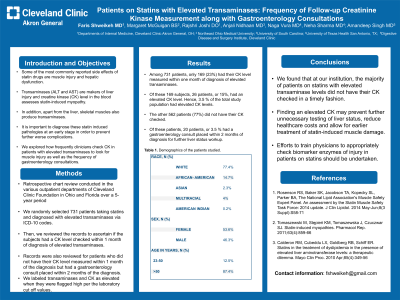Monday Poster Session
Category: Liver
P2940 - Patients on Statins with Elevated Transaminases: Frequency of Follow-up Creatinine Kinase Measurement Along with Gastroenterology Consultations
Monday, October 28, 2024
10:30 AM - 4:00 PM ET
Location: Exhibit Hall E

Has Audio

Faris Shweikeh, MD
Cleveland Clinic Akron General
Akron, OH
Presenting Author(s)
Faris Shweikeh, MD1, Margaret McGuigan, BS2, Rajshri Joshi, DO1, Anjali Nidhaan, MD3, Neha Sharma, MD4, Naga Venkata Rama Krishna Vura, MD5, Amandeep Singh, MD1
1Cleveland Clinic Akron General, Akron, OH; 2Northeast Ohio Medical University, Rootstown, OH; 3Prisma Health/University of South Carolina School of Medicine, Columbia, SC; 4University of Texas Health Science Center, San Antonio, TX; 5University of Texas Health San Antonio, San Antonio, TX
Introduction: Some of the most commonly reported side effects of statin drugs are muscle injury and hepatic dysfunction. Transaminases (ALT and AST) are makers of liver injury and creatine kinase (CK) level in the blood assesses statin-induced myopathy. In addition, apart from the liver, skeletal muscles also produce transaminases. It is important to diagnose these statin induced pathologies at an early stage in order to prevent further worse complications. We explored how frequently clinicians check CK in patients with elevated transaminases to look for muscle injury as well as the frequency of gastroenterology consultations.
Methods: This was a retrospective chart review conducted in the various outpatient departments of Cleveland Clinic Foundation in Ohio and Florida over a 5-year period, from May 2017 to May 2022. We randomly selected 731 patients taking statins and diagnosed with elevated transaminases via ICD-10 codes. Then, we reviewed the records to ascertain if the subjects had a CK level checked within 1 month of diagnosis of elevated transaminases. Records were also reviewed for patients who did not have their CK level measured within 1 month of the diagnosis but had a gastroenterology consult placed within 2 months of the diagnosis. We labeled transaminases and CK as elevated when they were flagged high per the laboratory cut off values.
Results: Among 731 patients, only 169 (23%) had their CK level measured within one month of diagnosis of elevated transaminases. Of these 169 subjects, 26 patients, or 15%, had an elevated CK level. Hence, 3.5 % of the total study population had elevated CK levels. The other 562 patients (77%) did not have their CK checked. Of these patients, 20 patients, or 3.5 % had a gastroenterology consult placed within 2 months of diagnosis for further liver status workup.
Discussion: We found that at our institution, the majority of patients on statins with elevated transaminase levels did not have their CK checked in a timely fashion. Finding an elevated CK may prevent further unnecessary testing of liver status, reduce healthcare costs and allow for earlier treatment of statin-induced muscle damage. Efforts to train physicians to appropriately check biomarker enzymes of injury in patients on statins should be undertaken.
Disclosures:
Faris Shweikeh, MD1, Margaret McGuigan, BS2, Rajshri Joshi, DO1, Anjali Nidhaan, MD3, Neha Sharma, MD4, Naga Venkata Rama Krishna Vura, MD5, Amandeep Singh, MD1. P2940 - Patients on Statins with Elevated Transaminases: Frequency of Follow-up Creatinine Kinase Measurement Along with Gastroenterology Consultations, ACG 2024 Annual Scientific Meeting Abstracts. Philadelphia, PA: American College of Gastroenterology.
1Cleveland Clinic Akron General, Akron, OH; 2Northeast Ohio Medical University, Rootstown, OH; 3Prisma Health/University of South Carolina School of Medicine, Columbia, SC; 4University of Texas Health Science Center, San Antonio, TX; 5University of Texas Health San Antonio, San Antonio, TX
Introduction: Some of the most commonly reported side effects of statin drugs are muscle injury and hepatic dysfunction. Transaminases (ALT and AST) are makers of liver injury and creatine kinase (CK) level in the blood assesses statin-induced myopathy. In addition, apart from the liver, skeletal muscles also produce transaminases. It is important to diagnose these statin induced pathologies at an early stage in order to prevent further worse complications. We explored how frequently clinicians check CK in patients with elevated transaminases to look for muscle injury as well as the frequency of gastroenterology consultations.
Methods: This was a retrospective chart review conducted in the various outpatient departments of Cleveland Clinic Foundation in Ohio and Florida over a 5-year period, from May 2017 to May 2022. We randomly selected 731 patients taking statins and diagnosed with elevated transaminases via ICD-10 codes. Then, we reviewed the records to ascertain if the subjects had a CK level checked within 1 month of diagnosis of elevated transaminases. Records were also reviewed for patients who did not have their CK level measured within 1 month of the diagnosis but had a gastroenterology consult placed within 2 months of the diagnosis. We labeled transaminases and CK as elevated when they were flagged high per the laboratory cut off values.
Results: Among 731 patients, only 169 (23%) had their CK level measured within one month of diagnosis of elevated transaminases. Of these 169 subjects, 26 patients, or 15%, had an elevated CK level. Hence, 3.5 % of the total study population had elevated CK levels. The other 562 patients (77%) did not have their CK checked. Of these patients, 20 patients, or 3.5 % had a gastroenterology consult placed within 2 months of diagnosis for further liver status workup.
Discussion: We found that at our institution, the majority of patients on statins with elevated transaminase levels did not have their CK checked in a timely fashion. Finding an elevated CK may prevent further unnecessary testing of liver status, reduce healthcare costs and allow for earlier treatment of statin-induced muscle damage. Efforts to train physicians to appropriately check biomarker enzymes of injury in patients on statins should be undertaken.
Disclosures:
Faris Shweikeh indicated no relevant financial relationships.
Margaret McGuigan indicated no relevant financial relationships.
Rajshri Joshi indicated no relevant financial relationships.
Anjali Nidhaan indicated no relevant financial relationships.
Neha Sharma indicated no relevant financial relationships.
Naga Venkata Rama Krishna Vura indicated no relevant financial relationships.
Amandeep Singh indicated no relevant financial relationships.
Faris Shweikeh, MD1, Margaret McGuigan, BS2, Rajshri Joshi, DO1, Anjali Nidhaan, MD3, Neha Sharma, MD4, Naga Venkata Rama Krishna Vura, MD5, Amandeep Singh, MD1. P2940 - Patients on Statins with Elevated Transaminases: Frequency of Follow-up Creatinine Kinase Measurement Along with Gastroenterology Consultations, ACG 2024 Annual Scientific Meeting Abstracts. Philadelphia, PA: American College of Gastroenterology.
